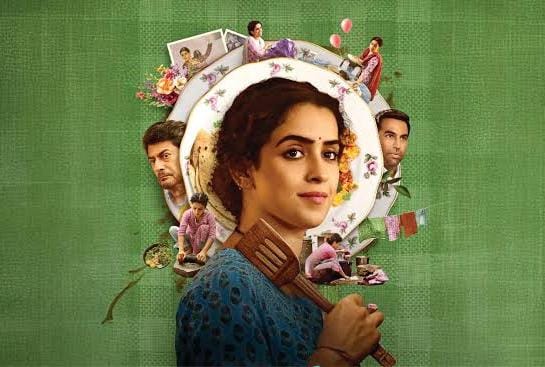By: Farheen Naaz
The Hindi adaptation of The Great Indian Kitchen, Mrs. is a thought-provoking film directed by Arati Kadav featuring Sanya Malhotra in the lead role. While the original Malayalam film made waves with its bold portrayal of gender roles within Indian households. This version successfully brings the same intensity to a wider audience. The movie sheds light on the everyday struggles of women in traditional households. Instead of dramatic fights or obvious oppression, it focuses on the small, unspoken ways women are made to feel invisible in their own homes. The film follows Richa (played by Sanya Malhotra), a young, educated woman who enters into an arranged marriage full of dreams and hopes. However, as she settles into her new home, she realizes that her role in the household is predefined – cooking, cleaning, and serving, with little to no recognition of her own aspirations or individuality.
The film doesn’t show extreme violence or abuse -it highlights something more common but equally painful, the constant expectation that women should handle everything at home without complaining. Richa’s feelings, dreams, and frustrations are ignored, and she is expected to simply ‘adjust’ like generations of women before her. The film forces us to reflect on things we often take for granted: who does the household work in our own homes, and do they get the respect they deserve?. The biggest strength of Mrs. is that it feels real. It doesn’t show exaggerated drama but rather a slow, painful realization of how women’s contributions are undervalued. The movie highlights how patriarchy is not just enforced by men sometimes, older women in the family also continue these traditions, expecting younger women to follow the same rules they once had to obey. Instead of loud protests, Richa’s resistance is silent but powerful. The movie builds up slowly, leading to a satisfying ending where she finally takes a stand for herself.

Sanya Malhotra’s performance is another standout aspect of the film. She embodies Richa with incredible nuance, seamlessly portraying the transition from a hopeful, independent woman to someone grappling with an internal crisis. Her expressions, body language, and subtle shifts in tone effectively communicate the silent frustration, helplessness, and eventual awakening of her character. Beyond being a commentary on domestic gender roles, Mrs. also serves as a broader critique of how societal norms dictate the lives of women, often stripping them of their agency without explicit coercion. The film raises important questions: Why are certain responsibilities automatically assigned to women? Why is unpaid domestic labor taken for granted? And most importantly, why does this pattern continue to persist despite changing times?
By the time the film reaches its conclusion, it leaves viewers with a mix of emotions – anger, empathy, and perhaps even a sense of self-reflection. It encourages audiences to reconsider their own perceptions of gender roles and domestic expectations.
Overall, Mrs. is a powerful and necessary film that holds up a mirror to society, urging people to recognize and challenge deeply ingrained biases. It is a cinematic experience that not only sheds light on the struggles of countless women but also calls for change in the most organic and thought-provoking manner.
If you’re looking for an entertaining, light-hearted film, this might not be the right choice. But if you want a film that sparks important conversations about gender roles, relationships, and respect within families, Mrs. is a must-watch.